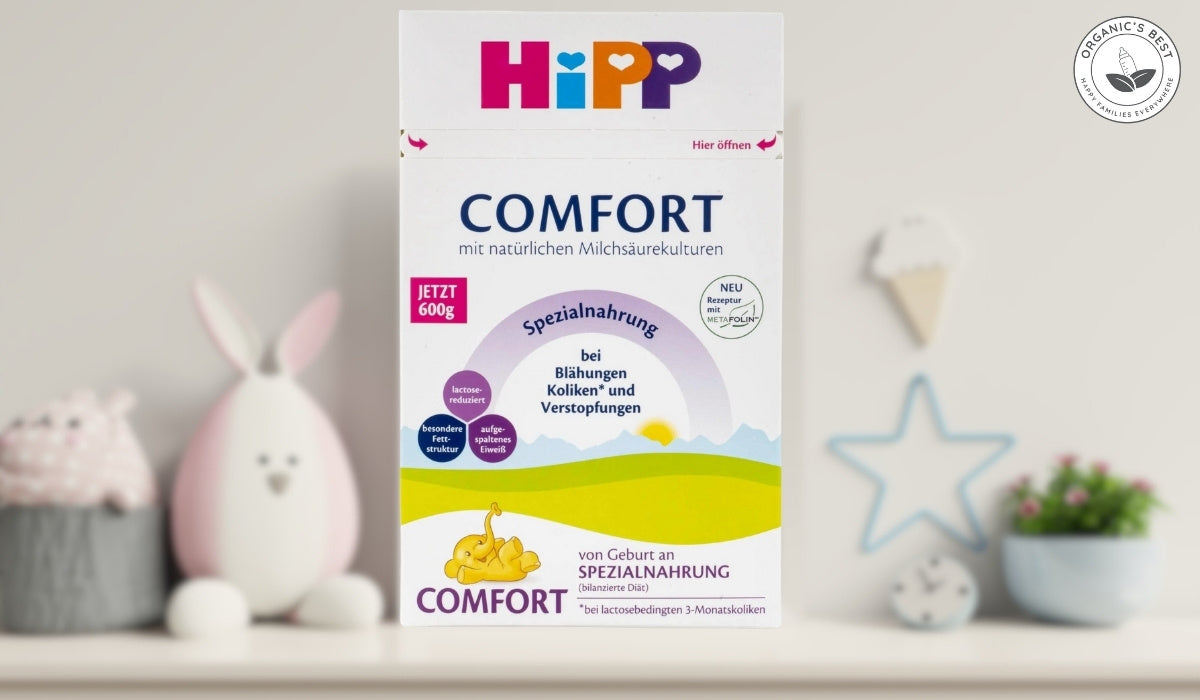Click to Get 2 FREE Boxes/Cans
Only New Customers! Click HERE to Get 2 Extra Boxes/Cans for Free With Your First Order.
BABY FORMULA
Offering new parents top-quality European infant formula from renowned brands like HiPP, Holle, Kendamil, and more. If you’re uncertain about which product to choose, our Formula Finder can help you make the best decision for your baby.
Baby Food
Offering new parents a premium selection of European baby foods, including jars, pouches, cereals, and snacks from esteemed brands like HiPP and Holle.
The Best Gentle Formula for Sensitive Babies
by Agustina Fernandez December 26, 2023 10 min read

Just as some adults have dietary preferences and sensitivities, our formula-fed little ones, too, may require a gentler touch when it comes to their nutrition. For parents facing the added complexity of a sensitive baby, the array of options in the infant formula aisle can seem overwhelming.
But fear not! Whether you're a first-time parent seeking advice or a seasoned caregiver searching for a better solution, we invite you to join us as we explore the realm of gentle baby formulas, ensuring that your baby's nutritional needs are met with utmost care for a happy and healthy start in life!
Table of Contents
Sensitive Babies: Understanding the Need for Gentle Infant Formula
Some babies have more sensitive digestive systems than others, leading to discomfort, fussiness, or digestive issues. This can make feeding time difficult regardless of whether their diet consists of baby formula, breast milk, or a combination of both. Understanding why your baby might need a gentle baby formula can be the first step toward ensuring their well-being, so let's explore some potential cases in which your child could benefit from a gentler option:

-
Digestive Sensitivity: Babies with sensitive tummies might experience gas, bloating, or colic when fed with standard infant formulas. These issues can be caused by difficulties in digesting intact milk proteins or other components of regular formulas.
-
Food Allergies or Sensitivities: Some babies may have allergies or sensitivities to ingredients commonly found in regular formulas, such as cow's milk protein or soy. These allergies or sensitivities can lead to skin rashes, diarrhea, or other uncomfortable symptoms.
-
Reflux: Babies who frequently spit up or suffer from gastroesophageal reflux (GERD) may benefit from a gentler formula designed to reduce reflux symptoms and minimize discomfort.
You can also visit our Best Formula for Reflux collection page to have more information!
-
Prematurity or Low Birth Weight: Premature babies or those with low birth weight often have underdeveloped digestive systems. They may require a specialized, gentle formula to support their growth and development without straining their delicate digestive tracts.
-
Mother's Diet and Breastfeeding Challenges: While breast milk is the best nutrition for babies, certain foods in a mother's diet can sometimes lead to digestive discomfort. Often, resolving the issue can be as simple as identifying and removing the offending food (like dairy in cases of CMPA) from the mother's diet. Continuing to breastfeed, whenever possible, remains the optimal choice, even as dietary adjustments are made!
Top 5 Picks: The Best European Gentle Formulas for Sensitive Babies
It's time to talk about some of the most gentle baby formula options we offer to little ones. Enjoy reading the pros and cons of the best conventional and organic gentle infant formula from Organic's Best. Each of these formulas is free of corn syrup solids and held to strict European infant nutrition standards. Join us as we dive into some other reasons why we love these formulas!

Jovie - Organic Gentle Infant Formula Based on Goat Milk
Research reveals that proteins in goat's milk proteins are more digestible than those in cow's milk, making Jovie a great, easy-to-digest formula option. Further, with lower lactose content than cow's milk, goat's milk stands out as a gentle alternative. Plus, it tends to be less allergenic.
However, be cautious: Babies diagnosed with cow's milk protein allergy (CMPA) might also react to goat's milk. So just remember, it's not recommended for babies with confirmed or suspected CMPA.
Pros 👍:
-
EU-certified organic
-
Whole goat milk base
-
Naturally A2 milk
-
Enriched with prebiotics
-
DHA (Omega-3) and AA (Omega-6) for brain development and eyesight
-
No artificial sweeteners, flavors, or preservatives
-
No added maltodextrin
-
No palm oil
-
No GMOs
Cons 👎:
-
Contains fish oil
HiPP Comfort - Easy to Digest Formula with Extensively Hydrolyzed Milk
With extensively hydrolyzed proteins and a lower lactose content, Comfort formula is crafted to be easier on your baby's sensitive, growing digestive system.
Pros 👍:
-
Extensively hydrolyzed cow's milk proteins + reduced lactose for easier digestion
-
Enriched with prebiotics and probiotics
-
DHA (Omega-3) and ARA (Omega-6) for brain development and eyesight
-
Stool regulating effect
-
No artificial sweeteners, flavors, or preservatives
-
No GMOs
Cons 👎:
-
Contains fish oil and palm oil
-
Includes maltodextrin
-
Not EU-certified organic
HiPP HA - Best European Formula for Hypoallergenic Nutrition
One of the best European formula options is HiPP HA formula. This formula for sensitive tummies features extensively hydrolyzed whey protein meticulously broken down into smaller fragments.
Because it does not have intact milk proteins, it's a gentle choice often suggested for little ones with a family predisposition to eczema or those with milk protein sensitivities. It also includes prebiotics and probiotics for immune system support. However, it may not be suitable for babies with diagnosed or suspected CMPA.
Pros 👍:
-
Extensively hydrolyzed cow's milk proteins
-
Lactose based
-
Enriched with prebiotics and probiotics
-
DHA (Omega-3) and ALA (Omega-6) for brain development and eyesight
-
No artificial sweeteners, flavors, or preservatives
-
No GMOs
Cons 👎:
-
Contains fish oil and palm oil
-
Not EU-certified organic
BebeM - Best European Baby Formula for Vegan Diets
BebeM organic gentle infant formula is based on hydrolyzed rice with proteins broken down into smaller fragments. This process makes the formula easier to digest and less allergenic for babies.
These formulas can be particularly beneficial for infants who exhibit sensitivities or allergies to cow's milk proteins, offering a gentler and more tolerable alternative for their delicate digestive systems.
Pros 👍:
-
EU & AB France certified organic
-
100% plant-based ingredients suitable for vegans
-
Hydrolyzed rice protein base
-
Added carob gum and corn starch to reduce reflux
-
Gluten and soy-free
-
Suitable for babies with dairy allergies, lactose intolerance, and excessive regurgitation
-
DHA (Omega-3) and LA (Omega-6) for brain development and eyesight
-
No artificial sweeteners, flavors, or preservatives
-
No palm oil
-
No GMOs
Cons 👎:
-
Some babies may initially find its taste different from cow or goat milk formula
Holle A2 - Gentle A2 Cow's Milk Formula for Sensitive Tummies
A2 cow's milk formulas are sourced from specific cows that exclusively produce the A2 protein type. This unique protein composition is believed to be gentler on digestion because it doesn't release BCM-7, a peptide linked to digestive discomfort in A1 milk.
Interestingly, goat's milk naturally contains mostly A2 proteins, aligning it with the same potential benefits for easier digestion. This shared characteristic makes both cow-based A2 formulas and goat's milk appealing options for those seeking gentler alternatives to traditional cow's milk formulas.
Pros 👍:
-
EU-certified organic
-
Gentle A2 cow's milk proteins for smoother digestion
-
Simple minimal ingredients
-
Plant-based DHA (Omega-3) and ARA (Omega-6) for brain development and eyesight
-
No fish oil
-
No artificial sweeteners, flavors, or preservatives
-
No GMOs
Cons 👎:
-
Contains palm oil
Before trying out any of our gentle baby formula picks for your little one, please consult your pediatrician to ensure it's the right fit for your child.
Key Features of Gentle Baby Formula
When it comes to choosing a gentle baby formula, various attributes distinguish them from standard formulas. Here are some common features you'll find in gentle baby formula and how they support digestive health in fussy babies and gassy babies:

-
Lower Lactose Content: Gentle baby formulas often contain reduced levels of lactose compared to regular formulas. This adjustment is beneficial for babies who find it difficult to digest lactose. However, for babies that have been diagnosed lactose intolerant they will require a formula that is completely lactose-free.
-
Extensively or Partially Hydrolyzed Whey Protein: Most formulas contain intact milk proteins, whereas gentle baby formula sometimes will feature partially or extensively hydrolyzed whey protein, which is broken down into smaller pieces for easy digestion. This can ease the digestive process for babies with sensitive stomachs and reduce the risk of adverse reactions.
-
Prebiotics and Probiotics: Some gentle formulas include prebiotics and probiotics, which support a healthy balance of gut bacteria. This can aid in digestion and promote overall gastrointestinal well-being in infants.
-
Goat's Milk: Goat's milk is often used as an alternative protein source in gentle formulas. Studies have shown that the A2 milk proteins of goat's milk are more easily digestible than those in cow's milk, making it a suitable option for babies with sensitive digestive systems. Additionally, goat's milk is less allergenic than cow's milk, although it is not suitable for babies with diagnosed cow milk protein allergy (CMPA).
Collectively, these attributes aim to provide optimal nutrition while minimizing digestive issues for babies with sensitive digestive systems. However, consulting a healthcare professional is essential to ensure the chosen formula aligns with the specific needs and any existing conditions of your infant.
Transitioning to a Gentle Formula: Helpful Tips and Considerations
Transitioning your baby from a regular formula to a gentle one requires patience and careful consideration. Here are some practical tips to help make the process as smooth as possible:
1) Opt for a Gradual Transition: Start by mixing a small amount of the new gentle formula with your baby's current formula. Over the course of several days or weeks, gradually increase the proportion of the gentle formula while decreasing the regular formula.
2) Observe Feeding Patterns: Pay close attention to how your baby responds to the transition. Look for signs of discomfort, such as increased fussiness, gas, or changes in bowel movements. These can indicate whether the new formula is a good fit or if further adjustments are needed.
3) Stay Consistent: Once you've fully transitioned to the gentle formula, maintain consistency in feeding times and portions. This stability can help your baby adapt to the new formula more effectively.
4) Ensure Bottle and Nipple Compatibility: Ensure that the bottles and nipples you use are suitable for the new formula's consistency. Some gentle formulas may have a different texture, so choosing the right equipment can aid in feeding comfort.
5) Consult Your Healthcare Provider: If you encounter challenges during the transition or if your baby experiences persistent discomfort or adverse reactions, consult your pediatrician or healthcare provider. They can offer guidance tailored to your baby's specific needs.
By taking these steps, you can help ensure a smoother transition that respects your baby’s comfort and individual preferences
4 Signs of Improvement to Look Out for When Switching to Gentle Formula
As you transition to a gentle formula, it's essential to monitor your baby's well-being. Here are signs to look out for that indicate the transition is going smoothly:

1. Reduced Discomfort: Your baby should experience fewer digestive issues, such as gas, bloating, or fussiness, after the transition to a gentle formula.
2. Improved Bowel Movements: Look for changes in your baby's stool consistency. A successful transition should result in more regular and comfortable bowel movements.
3. Better Feeding Habits: If your baby begins to feed more comfortably and with less resistance, this is a positive sign that the gentle formula is suiting them better.
4. Increased Comfort: Your baby may display an overall improvement in comfort and happiness, indicating that their sensitive tummy is being better managed.
However, if you notice any persistent or worsening signs of discomfort, such as severe colic, diarrhea, vomiting, rashes, or blood/mucus in stool, it's crucial to seek medical advice promptly. Your healthcare provider can assess your baby's specific condition and recommend alternative solutions or baby formula if necessary.
FAQs: Demystifying Gentle Formula for Babies
Now it's time to answer some of your most frequently asked questions about gentle baby formula!
What is the Difference Between Gentle and Regular Formula?
Gentle formulas are specially designed to be easier on a baby's digestive system. They often feature attributes such as lower lactose content, partially hydrolyzed proteins, and added prebiotics or probiotics.
In contrast, regular formulas contain standard ingredients and may not have these modifications. The key difference lies in their composition, tailored to address the needs of babies with more sensitive stomachs.
What is Gentle Formula Good For?
Gentle formulas are beneficial for babies who exhibit signs of digestive discomfort, including gas, bloating, colic, or fussiness, when fed with regular formulas. They can also be suitable for infants with allergies or sensitivities to certain ingredients commonly found in standard formulas.
Is Gentle Formula Better than Regular?
The choice between gentle and regular formula depends on your baby's individual needs. For babies with sensitive digestive systems or specific dietary requirements, gentle formulas may be a better fit. However, babies without these issues can thrive on regular formulas. It's essential to consult with a healthcare provider to determine which formula is most appropriate for your baby.
Which Formula is Most Gentle?
The most gentle formula for your baby depends on their specific sensitivities and dietary requirements. Some gentle formulas are designed for reduced lactose content, while others focus on hydrolyzed proteins or alternative protein sources like goat's milk. The "most gentle" formula varies from baby to baby, and consultation with a healthcare professional is essential to make the right choice.
Is Gentle the Same as Sensitive Formula?
Many parents find themselves asking, what is the difference between sensitive and gentle formula. While the terms "gentle" and "sensitive" are often used interchangeably, they may not always refer to the same type of formula. Sensitive formulas are typically designed for babies with specific sensitivities or allergies.
While "gentle" formulas, on the other hand, aim to provide a more comfortable and easily digestible option for a broader range of babies, including those with sensitive stomachs. It's crucial to read the formula's label and consult with a healthcare provider to ensure it meets your baby's specific needs.
What Infant Formula is Specially Formulated for Easy Digestion?
Some of the most gentle baby formula that we carry at organic's best include Jovie, HiPP Comfort, HiPP HA, Holle A2 and Bebe M formulas.
Conclusion
As parents, your unwavering dedication to your baby's health and happiness is truly admirable. The effort you put into researching, selecting, and transitioning to the right gentle formula demonstrates your love and commitment. Every baby is unique, and what matters most is your attentive care and the nurturing environment you provide. So, trust your instincts, seek guidance when needed, and embrace the joyous moments of parenthood!
|
Disclaimer: Please be aware that this information is based on general trends in babies, and it is not medical advice. Your doctor should be your first source of information and advice when considering any changes to your child’s formula and when choosing your child’s formula. Always consult your pediatrician before making any decisions about your child’s diet or if you notice any changes in your child. Breastfeeding is the best nutrition for your baby because breast milk provides your child with all the essential nutrients they need for growth and development. Please consult your pediatrician if your child requires supplemental feeding. |
Agustina Fernandez
Dr. Agustina Fernandez earned her medical degree from the prestigious Universidad Nacional de Córdoba, Argentina. With a deep-rooted passion for pediatrics, Dr. Fernandez is currently on the path to specializing in children's healthcare. Recently, she has delved into the vital field of infant nutrition. Her research interests include breastfeeding, infant formula, and baby food in little ones’ formative years. Dr. Fernandez's commitment to this area of study underscores her dedication to ensuring the health and well-being of children from their earliest days.
Leave a comment
Comments will be approved before showing up.
Also in Organic Infant Nutrition and Health Blog

10 Winter Activities for Kids and Toddlers
by Agustina Fernandez January 06, 2026 8 min read
Read More
How to Choose The Best Infant Formula: A Guide to EU Organic Formulas
by Agustina Fernandez January 05, 2026 14 min read
Read More
Best Formula for Breastfed Babies 2026 Guide
by Agustina Fernandez January 05, 2026 15 min read
Read More
Reviewed by Dr. Bardha Citaku, MD
-

Dr. Bardha Citaku: Medical Reviewer of Organic's Best Blog
Dr. Bardha Citaku completed her medical studies at the University of Prishtina in Kosovo, where she began her journey into the field of medicine. She has since developed a career in medical research, contributing to projects with notable organizations, including the World Health Organization (WHO).
